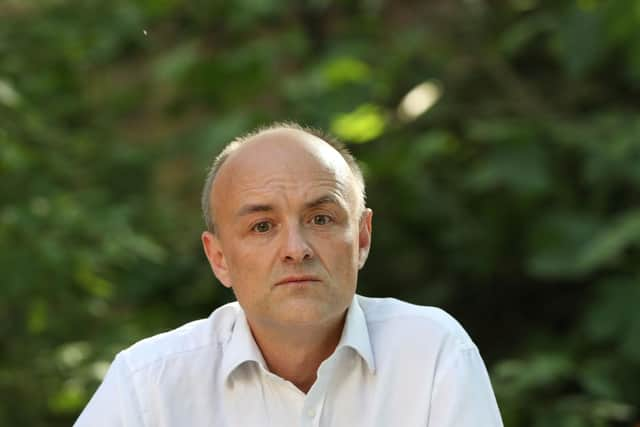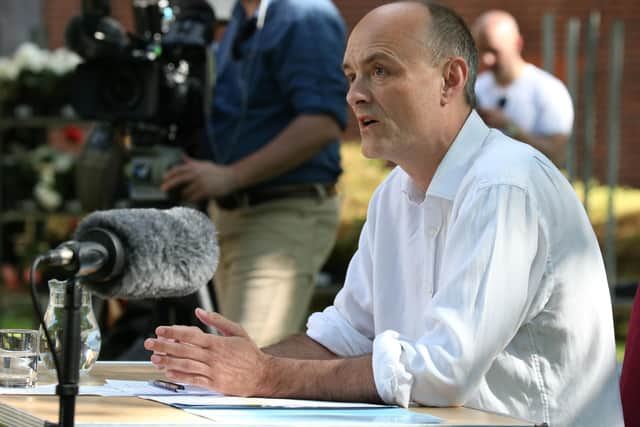Boris Johnson regrets ‘confusion and anger’ over Dominic Cummings saga
Nothing seen before in the backyard of Downing Street has matched the drama and tension of yesterday’s inquisition.
Instead of podiums there was a folding table; instead of suits, a rumpled white shirt half-tucked in. And instead of the polished, confident veneer of leadership, there was Dominic Cummings, the man behind the curtain, forced into a public scramble for reasons and justifications, and insisting in the face of overwhelming anger: “I don’t regret what I did.”
Advertisement
Hide AdAdvertisement
Hide AdIt was left for the Prime Minister to express remorse for his aide, telling journalists later that he regretted the “confusion and anger” the row over Mr Cummings’ actions had caused. Appropriately for the setting and the controversy, watching the press conference at home felt like peering over a garden hedge on to private grief.


Journalists – who were ranged in a socially-distanced pattern across the lawn on stacking chairs – walked up to a solitary microphone to deliver question after question and convey the hurt of a public confined for nearly ten weeks, unable to see loved ones in their hour of greatest need.
Confirming for the first time that he had travelled 260 miles with his wife and four-year-old son at the height of the coronavirus lockdown, Mr Cummings said he “tried to exercise my judgment the best I could”.
He added: “I believe that in all the circumstances I behaved reasonably and legally, balancing the safety of my family and the extreme situation in Number 10 and the public interest in effective government to which I could contribute.
“I was involved in decisions affecting millions of people and I thought that I should try to help as much as I could do.


“I can understand that some people will argue that I should have stayed at home in London throughout.”
Mr Cummings explained that his wife, the journalist Mary Wakefield, fell ill on 27 March, the same day that Boris Johnson’s coronavirus diagnosis was confirmed.
The Prime Minister’s top aide said he was worried that if both he and his wife fell ill, there was “nobody in London we could reasonably ask to look after our child and expose themselves to Covid”.
Advertisement
Hide AdAdvertisement
Hide AdMr Cummings also said stories which suggested he had opposed the lockdown and “did not care about many deaths” had “created a very bad atmosphere around my home” – and people “came to my house shouting threats”.
The family drove to Durham that evening and did not stop on the way, he said.
“I think what I did was actually reasonable in these circumstances. The rules made clear that if you are dealing with small children that can be exceptional circumstances,” Mr Cummings said.
“And I think that the situation that I was in was exceptional circumstances, and the way that I dealt with it was the least risk to everybody concerned if my wife and I had both been unable to look after our four-year-old.”
He insisted: “I don’t think I’m so different, and I don’t think there’s one rule for me and one rule for other people.”
They stayed in an “isolated property” on his father’s farm, where the following day he woke up in pain and “clearly had Covid symptoms”. By 11 April he was still feeling “weak and exhausted”, but no longer had symptoms, so thought he would be able to return to work.
He claimed that because his eyesight had been affected by the disease, his wife did not want to risk the long drive back to London, so they went on a “short drive” to nearby Barnard Castle.
Confronted with public anger over his actions, Mr Cummings said: “I understand these views, I know the intense hardship and sacrifice the entire country has had to go through. However, I respectfully disagree.”
Advertisement
Hide AdAdvertisement
Hide AdOnce Mr Cummings had finished being cross-examined, Cabinet ministers posted messages of support on social media.
“Dominic Cummings has made clear he was motivated by trying to protect his son and he took steps to be safe,” Chancellor Rishi Sunak wrote on Twitter. “I understand people had serious questions about his actions – indeed many of you have made huge sacrifices – but I do believe today he explained himself.”
Michael Gove posted: “It’s clear now that allegations were made which were untrue and Dominic Cummings acted legally and reasonably. Let’s concentrate on the work necessary to deal with the consequences of Covid-19.”
The Prime Minister had been expected to give the usual Downing Street press conference alongside Chief Medical Officer Professor Chris Whitty and Chief Scientific Officer Sir Patrick Vallance – the leading public health officials in England who have been the expert faces of the outbreak response.
But the two left Number 10 shortly before the press conference began, leaving Public Health England official Dr Yvonne Doyle to face the media alongside Mr Johnson.
The Prime Minister deflected questions on Mr Cummings, saying his aide had provided a “fulsome” response to questions in the Rose Garden.
And he justified the failure to disclose Mr Cummings’ whereabouts to the public by saying he “had a lot on my plate” when he was told, days into his own illness with coronavirus.
“I didn’t know about any of the arrangements in advance,” Mr Johnson said. “What I think did happen was while I was ill and about to get a lot sicker we had a brief conversation in which I think Dominic Cummings mentioned where he was.
Advertisement
Hide AdAdvertisement
Hide Ad“At that particular stage I had a lot on my plate and really didn’t focus on the matter until these stories started to emerge in the last few days.”
But while his aide had declined to, the Prime Minister expressed some remorse.
“Do I regret what has happened? Yes, of course I do regret the confusion and the anger and the pain that people feel.” He added: “This is a country that has been going through the most tremendous difficulties and suffering in the course of the last ten weeks and that’s why I really did want people to understand exactly what had happened.”
Mr Johnson said that he could not give anyone “unconditional backing”. But challenged to say if he expected the public to believe Mr Cummings drove to Barnard Castle to test his eyesight, the Prime Minister reached into his pocket and produced a pair of glasses as a token of his loyalty.
“I’m finding that I have to wear spectacles for the first time in years – I think because of the effects of this thing – so I’m inclined to think there’s some ... I think that’s very, very plausible that eyesight can be a problem associated with coronavirus.”
Comments
Want to join the conversation? Please or to comment on this article.